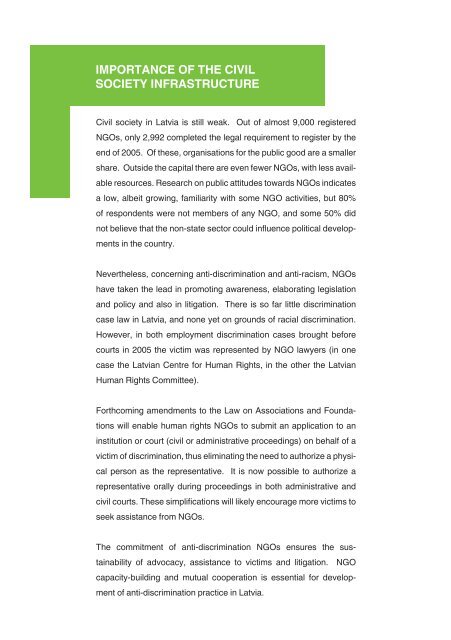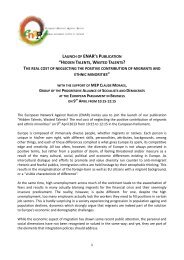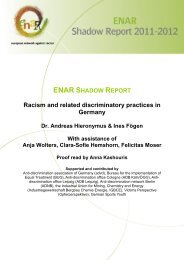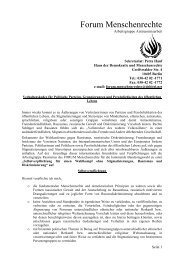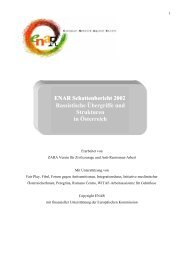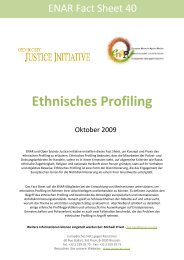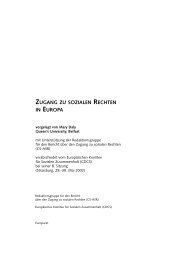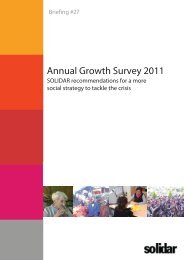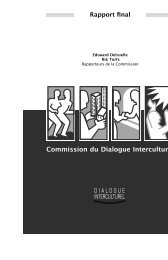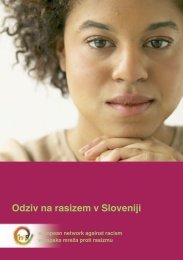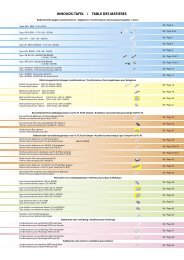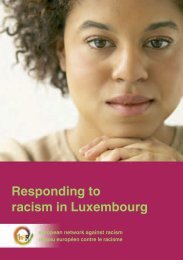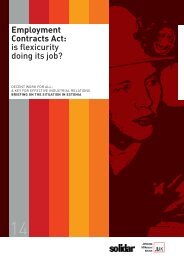Responding to racism in Latvia - Horus
Responding to racism in Latvia - Horus
Responding to racism in Latvia - Horus
Create successful ePaper yourself
Turn your PDF publications into a flip-book with our unique Google optimized e-Paper software.
importancE of thE civil<br />
sociEty <strong>in</strong>frastructurE<br />
Civil society <strong>in</strong> <strong>Latvia</strong> is still weak. Out of almost 9,000 registered<br />
NGOs, only 2,992 completed the legal requirement <strong>to</strong> register by the<br />
end of 2005. Of these, organisations for the public good are a smaller<br />
share. Outside the capital there are even fewer NGOs, with less avail-<br />
able resources. Research on public attitudes <strong>to</strong>wards NGOs <strong>in</strong>dicates<br />
a low, albeit grow<strong>in</strong>g, familiarity with some NGO activities, but 80%<br />
of respondents were not members of any NGO, and some 50% did<br />
not believe that the non-state sec<strong>to</strong>r could <strong>in</strong>fluence political develop-<br />
ments <strong>in</strong> the country.<br />
Nevertheless, concern<strong>in</strong>g anti-discrim<strong>in</strong>ation and anti-<strong>racism</strong>, NGOs<br />
have taken the lead <strong>in</strong> promot<strong>in</strong>g awareness, elaborat<strong>in</strong>g legislation<br />
and policy and also <strong>in</strong> litigation. There is so far little discrim<strong>in</strong>ation<br />
case law <strong>in</strong> <strong>Latvia</strong>, and none yet on grounds of racial discrim<strong>in</strong>ation.<br />
However, <strong>in</strong> both employment discrim<strong>in</strong>ation cases brought before<br />
courts <strong>in</strong> 2005 the victim was represented by NGO lawyers (<strong>in</strong> one<br />
case the <strong>Latvia</strong>n Centre for Human Rights, <strong>in</strong> the other the <strong>Latvia</strong>n<br />
Human Rights Committee).<br />
Forthcom<strong>in</strong>g amendments <strong>to</strong> the Law on Associations and Founda-<br />
tions will enable human rights NGOs <strong>to</strong> submit an application <strong>to</strong> an<br />
<strong>in</strong>stitution or court (civil or adm<strong>in</strong>istrative proceed<strong>in</strong>gs) on behalf of a<br />
victim of discrim<strong>in</strong>ation, thus elim<strong>in</strong>at<strong>in</strong>g the need <strong>to</strong> authorize a physi-<br />
cal person as the representative. It is now possible <strong>to</strong> authorize a<br />
representative orally dur<strong>in</strong>g proceed<strong>in</strong>gs <strong>in</strong> both adm<strong>in</strong>istrative and<br />
civil courts. These simplifications will likely encourage more victims <strong>to</strong><br />
seek assistance from NGOs.<br />
The commitment of anti-discrim<strong>in</strong>ation NGOs ensures the sus-<br />
ta<strong>in</strong>ability of advocacy, assistance <strong>to</strong> victims and litigation. NGO<br />
capacity-build<strong>in</strong>g and mutual cooperation is essential for develop-<br />
ment of anti-discrim<strong>in</strong>ation practice <strong>in</strong> <strong>Latvia</strong>.


